|
|
|
Sort Order |
|
|
|
Items / Page
|
|
|
|
|
|
|
| Srl | Item |
| 1 |
ID:
139903
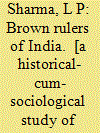

|
|
|
|
|
| Publication |
DelhI, Konark Publishers Pvt Ltd., 1988.
|
| Description |
xii, 154p.hbk
|
| Standard Number |
8122000770
|
|
|
|
|
|
|
|
|
|
|
|
Copies: C:1/I:0,R:0,Q:0
Circulation
| Accession# | Call# | Current Location | Status | Policy | Location |
| 029268 | 954.04/SHA 029268 | Main | On Shelf | General | |
|
|
|
|
| 2 |
ID:
180312
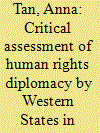

|
|
|
|
|
| Summary/Abstract |
Myanmar (Burma) from 2007 to 2020 observed a short-lived détente with major Western governments after decades of ostracism. Armed conflict and mass atrocities worsened despite significant democratisation. The article outlines Myanmar's short-lived democratic rule from beginning to end, before its coup d'etat in early 2021 and acceleration to state failure by the time of writing. This article assesses the strengths and limitations of Western human rights diplomacy vis-à-vis Myanmar during this 14-year frame, using in-depth interviews with former/working diplomats and experts as primary sources, in addition to secondary sources. Ostracism dominated Western bilateralism pre-2011, followed by the principled engagement of Australia, Norway and the UNSG's good offices, the latter based on Articles 98 and 99 of the UN Charter. Myanmar's military democratised with the aim of counterbalancing overdependence on China and seeking legitimacy as reformers. A reverse trend was observed after the 2016 Rohingya crisis. It demonstrates the dangers of neglecting the law of diminishing returns through advocacy, and of conflating domestic democracy and human rights advocates as principled practitioners. It concludes that it is in the pragmatic interests of Western governments to coordinate and institutionalise human rights principles in longer-term foreign policymaking, and that democratisation before peacebuilding increases state fragility.
|
|
|
|
|
|
|
|
|
|
|
|
|
|
|
|
| 3 |
ID:
140344
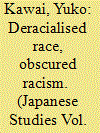

|
|
|
|
|
| Summary/Abstract |
This paper examines the interrelationships among Japaneseness, the Western and Japanese concepts of race, and the obfuscation of racism in contemporary Japanese society. The concept of race, which was conceived in the West in the modern era, has influenced the Japanese concepts of race, jinshu and minzoku. These two concepts played a key role in constructing modern Japan’s identity by distinguishing it from its significant discursive Others: Asia and the West. Today the Japanese simply call themselves nihonjin, or Japanese people, rarely using the terms jinshu and minzoku, and racism is generally viewed as a ‘foreign issue’ that has little relevance to Japanese society. The purpose of this study is threefold. First, it discusses how the Japanese concepts of race, jinshu and minzoku, were constructed and shaped the dominant meaning of the Japanese in different historical contexts, intertwining with Western notions of race, nation, Volk, and ethnicity. Second, it suggests that obscured racism in contemporary Japan is linked with the conceptual presence and nominal absence of jinshu and minzoku in defining Japaneseness. Third, it explores how the contemporary modality of racism in Japan overlaps with and differs from racisms in the West.
|
|
|
|
|
|
|
|
|
|
|
|
|
|
|
|
| 4 |
ID:
105926
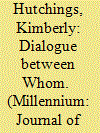

|
|
|
|
|
| Publication |
2011.
|
| Summary/Abstract |
There is a politics to the West/non-West distinction that is bound up with predominant models for dialogue in IR; rethinking these models of dialogue implies a new politics, and therefore also, I will suggest, a move away from the West/non-West binary as a way of characterising the participants in dialogic exchange oriented towards the expansive transformation of disciplinary imaginaries.
|
|
|
|
|
|
|
|
|
|
|
|
|
|
|
|
| 5 |
ID:
100939
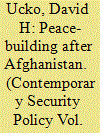

|
|
|
|
|
| Publication |
2010.
|
| Summary/Abstract |
Engagement in various forms of peace-building has increased dramatically since the Cold War, yet what is the future of peace-building in the aftermath of the troubled intervention in Afghanistan? This article argues that while many Western and allied governments will feel chastened by the experience in Central Asia, their impulse to 'do good' internationally will not altogether disappear. Instead, to avoid manage the complexity of future interventions, intervening government may be tempted to reinvoke the traditional peace-building principles drawn from the 1990s - neutrality, consent-based operations, and the minimum use of force. Such a tendency, this article argues, is based on a flawed historical understanding of the experiences of the 1990s and underestimates what it takes to build peace after war. Dissecting the peace-building principles in light of more recent experiences with counterinsurgency, the article explores the full requirements for effective intervention in war-to-peace transitions. It then concludes by discussing what these requirements mean for those states that express interest in peace-building, but whose commitment and capabilities are often found lacking.
|
|
|
|
|
|
|
|
|
|
|
|
|
|
|
|
| 6 |
ID:
084413
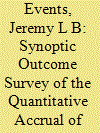

|
|
|
| 7 |
ID:
084227
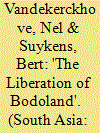

|
|
|
|
|
| Publication |
2008.
|
| Summary/Abstract |
Bodoland, located in western Assam, has been a theatre for insurgencies since the mid 1980s. Too often, migration has been the paradigmatic framework to analyse not only this, but most conflicts, raging in Assam. In this article we argue that migration in itself is insufficient to understand the problems in Bodoland. Instead, we focus on forestry and tea estates, and contend that they, forming important restrictive structures, caused tribal entrapment, finally leading to violence. Moreover, we claim that during the conflict a shift in control over these structures occurred, changing the livelihood arithmetic of the involved communities. Finally, we discuss both the restraints and opportunities of the BTC/BTAD (Bodoland Territorial Council/Bodoland Territorial Administrative District)-the result of the peace process-and warn that the escape from entrapment for the Bodo could lead to the entrapment of other communities in the area.
|
|
|
|
|
|
|
|
|
|
|
|
|
|
|
|
| 8 |
ID:
097129
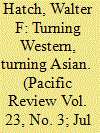

|
|
|
|
|
| Publication |
2010.
|
| Summary/Abstract |
Cultural analysis, an increasingly popular approach, contributes to our understanding of comparative and global politics by drawing needed attention to non-material factors. In some forms, however, this approach may also strip political actors of agency, treating norms and ideas as external, independent and determinative. Gramsci offers a useful corrective, highlighting the elusive link between material and non-material factors. I invoke Gramscian analysis to explain the otherwise confounding volatility in Japanese norms of identity, norms that over the past 150 years have appeared to flip-flop between "Western" and "Asian" poles. This case study reveals that dominant forces in Japan have used these competing social constructs to consolidate their hegemony or advance their particular interests at different historical moments.
|
|
|
|
|
|
|
|
|
|
|
|
|
|
|
|
|
|
|
|
|